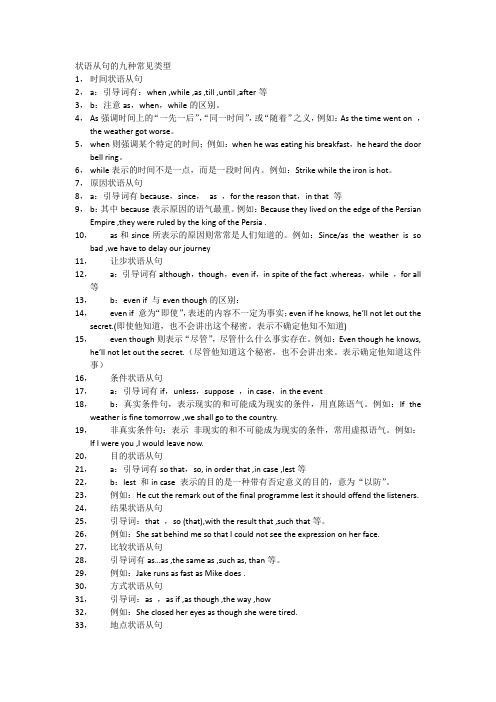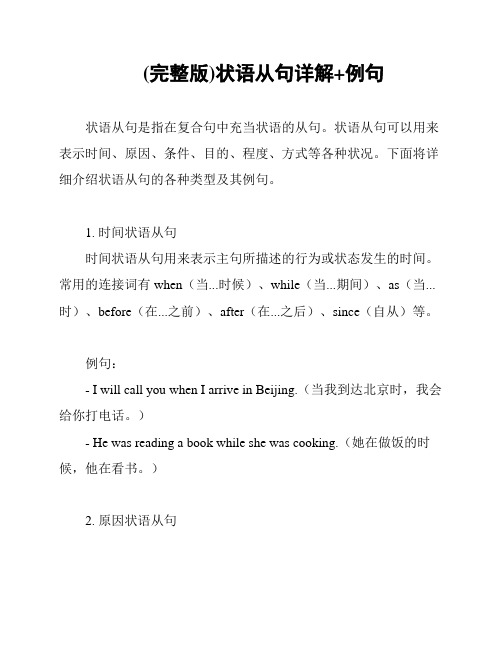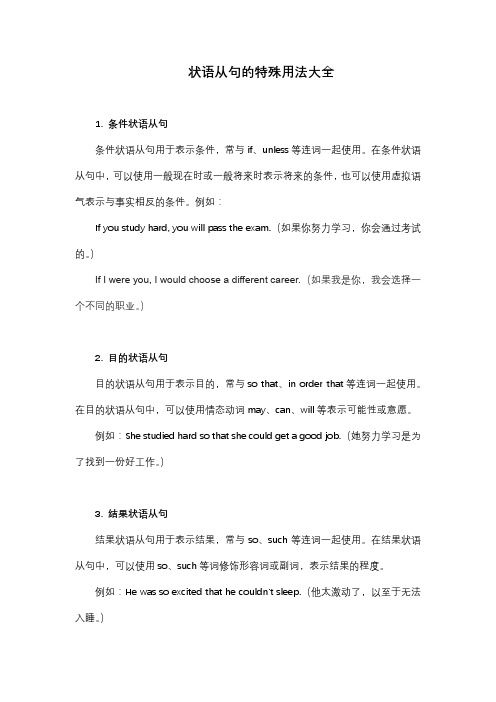壮语从句
状语从句(完整版)

While there is life there is hope. (while = __a_s_l_o_n_g_a_s_ )
状语时用来修饰 动 词, 形容 词, 副 词或 句子 的一种句子成分。它可以表示时间、地点、 原因、目的、结果、条件、让步、比较、方式等。 当充当状语的部分是一个句子时,也就是状语从
句。分类如下:
状语从句
1. 时间状语从句 2. 地点状语从句 3. 原因状语从句 4. 条件状语从句 5. 让步状语从句 6. 目的状语从句 7. 结果状语从句 8. 方式状语从句 9. 比较状语从句
I had no sooner begun to talk than he rang off. No sooner had I begun to talk than he rang off. 我还未来得及讲话,他就挂断了电话。
1. I was so familiar with him that I recognized his voice
考点:名词短语引导时间状语从句
• 1. When every time I was in trouble, he would come to help me.
• 2. At next time you come, do remember bring your son here.
• 3. For the first time I met the girl. I felt in love with her.
c.f. He might be ill, for he didn’t come to
状语从句的九种常见类型

状语从句的九种常见类型1,时间状语从句2,a:引导词有:when ,while ,as ,till ,until ,after等3,b:注意as,when,while的区别。
4,As强调时间上的“一先一后”,“同一时间”,或“随着”之义,例如:As the time went on ,the weather got worse。
5,when则强调某个特定的时间;例如:when he was eating his breakfast,he heard the door bell ring。
6,while表示的时间不是一点,而是一段时间内。
例如:Strike while the iron is hot。
7,原因状语从句8,a:引导词有because,since,as ,for the reason that,in that 等9,b:其中because表示原因的语气最重。
例如:Because they lived on the edge of the Persian Empire ,they were ruled by the king of the Persia .10,as和since所表示的原因则常常是人们知道的。
例如:Since/as the weather is so bad ,we have to delay our journey11,让步状语从句12,a:引导词有although,though,even if,in spite of the fact .whereas,while ,for all 等13,b:even if 与even though的区别:14,even if 意为“即使”,表述的内容不一定为事实;even if he knows, he’ll not let out the secret.(即使他知道,也不会讲出这个秘密。
表示不确定他知不知道)15,even though则表示“尽管”,尽管什么什么事实存在。
(完整版)状语从句详解+例句

(完整版)状语从句详解+例句状语从句是指在复合句中充当状语的从句。
状语从句可以用来表示时间、原因、条件、目的、程度、方式等各种状况。
下面将详细介绍状语从句的各种类型及其例句。
1. 时间状语从句时间状语从句用来表示主句所描述的行为或状态发生的时间。
常用的连接词有when(当...时候)、while(当...期间)、as(当...时)、before(在...之前)、after(在...之后)、since(自从)等。
例句:- I will call you when I arrive in Beijing.(当我到达北京时,我会给你打电话。
)- He was reading a book while she was cooking.(她在做饭的时候,他在看书。
)2. 原因状语从句原因状语从句用来表示主句所描述的行为或状态的原因。
常用的连接词有because(因为)、since(因为)、as(由于)、for (因为)等。
例句:- I can't go to the party because I have to work.(我不能去参加派对,因为我得工作。
)- Since it is raining, we should stay at home.(由于下雨了,我们应该待在家里。
)3. 条件状语从句条件状语从句用来表示主句所描述的行为或状态的前提条件。
常用的连接词有if(如果)、unless(除非)、whether(无论)、provided(倘若)等。
例句:- If it rains tomorrow, we will stay indoors.(如果明天下雨,我们会呆在室内。
)- We can go shopping unless it is too late.(除非太晚,否则我们可以去购物。
)4. 目的状语从句目的状语从句用来表示主句所描述的行为或状态的目的。
常用的连接词有so that(以便)、in order that(为了)、lest(免得)等。
状语从句

8.由as long as和so long as 引导的时间状语从句。这两个连词表示 “有多久……就多久”,通常译为“只 要”。 你可以随意到哪里去,只要在天黑以前回 来就行。 You can go where you like as long as you get back before dark. I will fight against these conditions as long as there is a breath in my body! 只要我一息尚存,我就要反对这种境况。
7.由each time, every time和whenever Each time he came to Harbin, he would call on me. 他每次来哈尔滨,总是来看我。 Whenever that man says“To tell the truth”, I suspect that he's about to tell a lie. 每当那个人说“说实在话”的时候,我猜想 他就要说谎了。 You grow younger every time I see you. 每次遇到你,见你更年轻了。
I worked until he came back. 我工作到他回来为止。 I didn't work until he came back. 他回来我这才开始工作。
4.由since引导的时间状语从句。 since引导的从句的谓语动词可以是延续性 的动词,又可以是瞬时动词。一般情况下, 从句谓语动词用一般过去时,而主句的谓 语动词用现在完成时。但在It is +时间+ since从句的句型中,主句多用一般现在时。 自从你离开以来,我一直在北京了。 I have been in Beijing since you left. 我妹妹不在北京住有四年了。 It is four years since my sister lived in Beijing.
八种状语从句

八种状语从句状语从句在句中作状语,修饰主句中的动词、形容词和副词等。
按其作用和意义可分为时间、原因、目的、结果、条件、让步、方式、比较八种。
下面对这八种从句的要点加以总结。
一、各类状语从句的引导词及易混词的区别。
1. 时间状语从句1) 引导词(1)表示“当……时候”:when, while, as, whenever(2)表示“一……就……”:as soon as(3)其它:after, before, since, until, by the timeWhenever he comes, he brings a friend. 他每次来都带个朋友。
I want to see him as soon as he arrives. 他一来我就要见他。
I went to bed after I finished my homework. 我做完家庭作业之后才睡觉。
2) 易混引导词when, while, as 的区别when既可指“时间点”,与瞬时动词连用,也可指“时间段”,与延续性动词连用(这时可与while互换)。
如:When he came in, his mother was cooking. 他进来时,他妈妈正在烧饭。
When(While)we were at school, we went to the library every day. 我们在校求学时,每天都到图书馆去。
while 只表示时间段,因此while从句的谓语动词要用延续性动词。
Please don' t talk so loud while others are talking. 别人在工作时,切勿大声讲话。
as 与when 用法相似,但着重强调主句动作与从句动作同时发生,有“随着……”或“一边……一边……”之意。
She sang as she went along. 她边走边唱。
As you get older, you get more knowledge.随着年龄的增长,你获得的知识就越多。
状语从句的特殊用法大全

状语从句的特殊用法大全1. 条件状语从句条件状语从句用于表示条件,常与if、unless等连词一起使用。
在条件状语从句中,可以使用一般现在时或一般将来时表示将来的条件,也可以使用虚拟语气表示与事实相反的条件。
例如:If you study hard, you will pass the exam.(如果你努力学习,你会通过考试的。
)If I were you, I would choose a different career.(如果我是你,我会选择一个不同的职业。
)2. 目的状语从句目的状语从句用于表示目的,常与so that、in order that等连词一起使用。
在目的状语从句中,可以使用情态动词may、can、will等表示可能性或意愿。
例如:She studied hard so that she could get a good job.(她努力学习是为了找到一份好工作。
)3. 结果状语从句结果状语从句用于表示结果,常与so、such等连词一起使用。
在结果状语从句中,可以使用so、such等词修饰形容词或副词,表示结果的程度。
例如:He was so excited that he couldn't sleep.(他太激动了,以至于无法入睡。
)4. 地点状语从句地点状语从句用于表示地点,常与where、wherever等连词一起使用。
在地点状语从句中,可以使用陈述句或虚拟语气,表示具体地点或可能性。
例如:Go where you want to go.(去你想去的地方。
)5. 时间状语从句时间状语从句用于表示时间,常与when、whenever等连词一起使用。
在时间状语从句中,可以使用一般现在时、一般过去时、将来时等表示具体时间或时间顺序。
例如:When you are ready, we can start.(当你准备好了,我们就可以开始。
)6. 让步状语从句让步状语从句用于表示尽管有困难或反对,但仍然坚持做某事。
状语从句的种类
状语从句的种类
状语从句是用来修饰主句的一种从句,它能充分描述事物发生的时间、条件、原因、让步等状态,使句子变得生动、形象。
根据状语从句的意义,可以将状语从句分为八种:
一、时间状语从句
时间状语从句在主句中用来表示事物发生的时间,它比一般状语从句更为完整,无论是常用的词或者时间状语从句均能将事情发生的时间表示出来,常用的连接词有: when, while, as soon as, before, after, since, till, until, by then, by the time, by the year等。
地点状语从句可以表示事物发生的地点,常用的连接词有: where, wherever。
原因状语从句在主句中用来表示事情发生的原因,常用的连接词有: because, now that, as, since, due to, owing to, for。
方式状语从句用来描述事物的发生方式,常用的连接词有: as, like, such as。
英语九大状语从句
英语九大状语从句:1.时间状语从句(Time adverbial clause):指定一个时间点或时间段。
例如:I will call you when I get home.(我回家后会给你打电话。
)2.地点状语从句(Place adverbial clause):指定一个地点或位置。
例如:She looked for her keys where she last saw them.(她在上次看到它们的地方找钥匙。
)3.原因状语从句(Reason adverbial clause):提供一个原因或解释。
例如:She didn't come to the party because she was feeling sick.(她因为感觉不舒服所以没有来参加派对。
)4.结果状语从句(Result adverbial clause):表达一个结果或效果。
例如:He studied hard, so he passed the exam.(他努力学习,所以考试通过了。
)5.条件状语从句(Conditional adverbial clause):表示一个条件。
例如:If it rains tomorrow, we will stay indoors.(如果明天下雨,我们会呆在室内。
)6.比较状语从句(Comparison adverbial clause):进行比较。
例如:He sings better than anyone else I know.(他唱得比我认识的任何人都好。
)7.目的状语从句(Purpose adverbial clause):表示一个目的或意图。
例如:I bought groceries so that I can cook dinner.(我买了杂货,这样我就能做晚饭了。
)8.方式状语从句(Manner adverbial clause):描述一个行为或方式。
例如:She speaks as if she knows everything.(她说话的样子好像她什么都知道。
状语从句用法详解
状语从句用法详解状语从句是英语语法中重要的句子成分,用于修饰句子中的动态或状态,告诉我们动作发生的时间、地点、原因、方式等相关信息。
本文将详细介绍状语从句的用法。
1. 时间状语从句:时间状语从句用于表示动作发生的时间关系。
常见的引导词有when,while,before,after,since等。
例如:- I will meet her when I finish work.(我下班后会和她见面。
)- We were having dinner while it started to rain.(我们正在吃饭时突然下雨了。
)2. 地点状语从句:地点状语从句用于表示动作发生的地点关系。
常见的引导词有where,wherever等。
例如:- I will go wherever you go.(无论你去哪,我都会跟着去。
)- She can find her keys where she left them.(她可以在她放钥匙的地方找到它们。
)3. 原因状语从句:原因状语从句用于表示某个动作或状态的原因。
常见的引导词有because,since,as等。
例如:- As it was getting late, we decided to leave.(由于时间很晚,我们决定离开。
)4. 方式状语从句:方式状语从句用于表示某个动作或状态的方式。
常见的引导词有as,like,as if等。
例如:- She danced as if nobody was watching.(她像没人看着一样跳舞。
)- He treats me like a princess.(他像对待公主一样对待我。
)需要注意的是,在使用状语从句时,需要注意主句和从句之间的时态和语序的一致性。
此外,状语从句通常位于主句之前或之后,但也可以放在主句的中间。
总结:状语从句是用于修饰句子中动态或状态的从句,用于表示时间、地点、原因、方式等相关信息。
状语从句的定义
状语从句的定义1、状语从句又称为状语性从句,是一种用来修饰句子成分(主要是表语、状语、宾语以及定语)的从句。
它的作用是起到充当状语的作用,用来表示状态、条件、原因、时间、让步、地点、方式、结果等,它一般位于句中的句首、句末或句中,有时还放在句子的中间。
2、状语从句可以用关系副词(when、where、why、how等)或关系代词(that、which、who等)来引导,其中关系副词引导的状语从句又可以称为副词性状语从句,而关系代词引导的状语从句可以称为代词性状语从句。
3、副词性状语从句主要有时间、地点、条件、原因、让步、目的、结果等状语从句,常用的副词有when、where、why、how等,而代词性状语从句则有性质、数量、原因、时间等状语从句,常用的代词有that、which、who、whom等。
4、时间状语从句是最常见的一种状语从句,通常用when、while、as、since、until等引导,它主要用来表示句子发生的时间,例如:I will go there when it is time。
5、地点状语从句也是常见的一种,通常用where引导,它主要用来表示句子发生的地点,例如:I live in a place where there is nopollution.6、条件状语从句是一种用来表示条件的状语从句,通常用if或unless引导,例如:I will go there if it is time。
7、原因状语从句是一种表示原因的状语从句,通常用because或since引导,例如:I'm late because I missed the bus.8、让步状语从句是一种表示让步关系的状语从句,通常用though、although、even though等引导,例如:Although it is late, I'm still going there.9、目的状语从句是一种表示目的的状语从句,通常用so that引导,例如:I will go to bed early tonight so that I can get up early tomorrow.10、结果状语从句是一种表示结果的状语从句,通常用so…that或such…that引导,例如:I was so tired that I fell asleep at once.。
- 1、下载文档前请自行甄别文档内容的完整性,平台不提供额外的编辑、内容补充、找答案等附加服务。
- 2、"仅部分预览"的文档,不可在线预览部分如存在完整性等问题,可反馈申请退款(可完整预览的文档不适用该条件!)。
- 3、如文档侵犯您的权益,请联系客服反馈,我们会尽快为您处理(人工客服工作时间:9:00-18:30)。
19. 状语从句19.1 地点状语从句地点状语从句通常由where, wherever 引导。
Where I live there are plenty of trees.我住的地方树很多。
Wherever I am I will be thinking of you.不管我在哪里我都会想到你。
19.2 方式状语从句方式状语从句通常由as, (just) as…so…, as if, as though引导。
1) as, (just) as…so…引导的方式状语从句通常位于主句后,但在(just) as…so…结构中位于句首,这时as从句带有比喻的含义,意思是"正如…","就像",多用于正式文体,例如:Always do to the others as you would be done by.你希望人家怎样待你,你就要怎样待人。
As water is to fish, so air is to man.我们离不开空气,犹如鱼儿离不开水。
Just as we sweep our rooms, so we should sweep backward ideas from our minds.正如打扫房屋一样,我们也要扫除我们头脑中落后的东西。
2) as if, as though两者的意义和用法相同,引出的状语从句谓语多用虚拟语气,表示与事实相反,有时也用陈述语气,表示所说情况是事实或实现的可能性较大。
汉译常作"仿佛……似的","好像……似的",例如:They completely ignore these facts as if (as though) they never existed.他们完全忽略了这些事实,就仿佛它不存在似的。
(与事实相反,谓语用虚拟语气。
)He looks as if (as though) he had been hit by lighting.他那样子就像被雷击了似的。
(与事实相反,谓语用虚拟语气。
)It looks as if the weather may pick up very soon.看来天气很快就会好起来。
(实现的可能性较大,谓语用陈述语气。
)说明:as if / as though也可以引导一个分词短语、不定式短语或无动词短语,例如:He stared at me as if seeing me for first time.他目不转睛地看着我,就像第一次看见我似的。
He cleared his throat as if to say something.他清了清嗓子,像要说什么似的。
The waves dashed on the rocks as if in anger.波涛冲击着岩石,好像很愤怒。
19.3 原因状语从句比较:because, since, as和for1)because语势最强,用来说明人所不知的原因,回答why提出的问题。
当原因是显而易见的或已为人们所知,就用as或 since。
I didn't go, because I was afraid.Since /As the weather is so bad, we have to delay our journey.2)由because引导的从句如果放在句末,且前面有逗号,则可以用for来代替。
但如果不是说明直接原因,而是多种情况加以推断,就只能用for。
He is absent today, because / for he is ill.He must be ill, for he is absent today.19.4 目的状语从句表示目的状语的从句可以由that, so that, in orderthat, lest, for fear that, in case等词引导,例如:You must speak louder so that /in order that you can be heard by all.He wrote the name down for fear that(lest) heshould forget it.Better take more clothes in case the weather is cold.19.5 结果状语从句结果状语从句常由so… that 或 such…that引导,掌握这两个句型,首先要了解so 和 such与其后的词的搭配规律。
比较:so和 such其规律由so与such的不同词性决定。
such 是形容词,修饰名词或名词词组,so 是副词,只能修饰形容词或副词。
so 还可与表示数量的形容词many, few, much, little连用,形成固定搭配。
so foolish such a foolso nice a flower such a nice flowerso many / few flowers such nice flowersso much / little money. such rapid progressso many people such a lot of people( so many 已成固定搭配,a lot of 虽相当于 many,但 alot of 为名词性的,只能用such搭配。
)so…that与such…that之间的转换既为 so与such之间的转换。
The boy is so young that he can't go to school.He is such a young boy that he can't go to school19.6 条件状语从句连接词主要有 if, unless, as/so long as, on condition that 等。
.if 引导的条件句有真实条件句和非真实条件句两种。
非真实条件句已在虚拟语气中阐述。
unless = if not.Let's go out for a walk unless you are too tired.If you are not too tied, let's go out for a walk.典型例题You will be late ___ you leave immediately.A. unlessB. untilC. ifD. or答案A。
句意:除非你立即走,否则你就回迟到的。
可转化为 If you dong leave immediately, you will be late. B、D句意不对,or表转折,句子如为 You leave immediately or you will be late.19.7 让步状语从句though, although注意:当有though, although时,后面的从句不能有but,但是 though 和yet可连用Although it's raining, they are still working inthe field.虽然在下雨,但他们仍在地里干活。
He is very old, but he still works very hard.虽然他很老,但仍然努力地工作。
Though the sore be healed, yet a scar may remain.伤口虽愈合,但伤疤留下了。
(谚语)典型例题1) ___she is young, she knows quite a lot.A. WhenB. HoweverC. AlthoughD. Unless答案:C。
意为虽然她很年轻,却知道许多。
2) as, though 引导的倒装句as / though引导的让步从句必须表语或状语提前(形容词、副词、分词、实义动词提前)。
Child as /though he was, he knew what was theright thing to do.= Though he was a small child, he knew what wasthe right thing to do.注意: a. 句首名词不能带任何冠词。
b. 句首是实义动词,其他助动词放在主语后。
如果实义动词有宾语和状语,随实义动词一起放在主语之前。
Try hard as he will, he never seems able todo the work satisfactorily.= Though he tries hard, he never seems…虽然他尽了努力,但他的工作总做的不尽人意。
3) ever if, even though. 即使We'll make a trip even though the weather isbad.4) whether…or- 不管……都Whether you believe it or not, it is true.5) "no matter +疑问词" 或"疑问词+后缀ever"No matter what happened, he would not mind.Whatever happened, he would not mind.替换:no matter what = whateverno matter who = whoeverno matter when = wheneverno matter where = whereverno matter which = whicheverno matter how = however注意:no matter 不能引导主语从句和宾语从句。
(错)No matter what you say is of no use now.(对)Whatever you say is of no use now.你现在说什么也没用了。
(Whatever you say是主语从句)(错)Prisoners have to eat no matter what they'regiven,(对)Prisoners have to eat whatever they'regiven. 囚犯们只能给什么吃什么。
19.7 让步状语从句though, although注意:当有though, although时,后面的从句不能有but,但是 though 和yet可连用Although it's raining, they are still working in the field.虽然在下雨,但他们仍在地里干活。
